the daily current
I want this blog to be an ongoing portal for mass-communication, focusing on Australian media and current affairs. I'll try not to make broad, sweeping statements without any supporting information. And, in case I do, feel free to leave a comment; positive/negative. I promise to read the blogs of everyone who comments.
Wednesday, May 31, 2006
KCB201: I'll tell you what I think ...
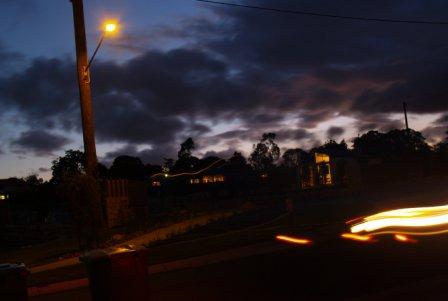 For Virtual Cultures we have to write a 500 word post about how we feel about our blogging experience; what we've discovered, how we've developed, skills, knowledge, etc.
For Virtual Cultures we have to write a 500 word post about how we feel about our blogging experience; what we've discovered, how we've developed, skills, knowledge, etc.Well can I just say - I've really discovered myself through this blog, I now hold a deep sense of recognition with my thoughts and I feel one with my keyboard [*if saying this will get me an HD, please stop reading now*]. Well, it's not really that hardcore, but I do find the blogging experience enjoyable and it's opened my eyes to the plethora of online information and, I suppose, forced me to think critically and creatively about the things I read. I find myself always thinking I wonder if I could blog about this article? Even when I'm reading really banal stuff like my old high school newsletters.
I created the daily current a while before Virtual Cultures - August last year I think - and at first I was posting quite regularly, about once a day - but I waned after a few months [you will realise this if you go through my archives] and eventually I stopped posting all together. But the great thing about blogs is they never go away, and I was able to pick up where I left off.
For a Media and Communications student like me, blogging is the perfect outlet to criticise the media as you learn to think like a journalist and consume the news on a higher level. Now when I scan the news, I find that I'm interested in a lot more issues and, when I do find an article that sparks my interest, I can read the same story from a number of different journalists, bloggers and news sources. Reading from diverse perspectives allows me to form my own opinion on the issue and whatever conclusions I come to, I publish here and then I feel [strangely] satisfied. Through blogging, I have the ability to pursue news stories that really interest me, involve myself in the issue and publish my thoughts for, if not everyone, at least myself to read in the future. I have also thought critically about blogging itself, and posted a few thoughts about whether bloggers are actually taking over the role of journalists or whether that idea is just a bit of hyperbole.
I have also found blogging is not just the act of typing thoughts into a window, hitting publish post, and wallowing in the thrill of having your words appear online. It's more: blogging is such an immersive act; it forces the blogger to constantly ponder topics from a number of angles, obsessively thinking what their own take on the matter is before publishing their thoughts as soon as they can.
My favourite style of blog is the MediaWatch-esque ones that provide editorial commentary - usually at least a little cheeky - on mainstream media and their various vulnerabilities and quirks. It's as thought the entire blogosphere is anti-mainstream, which makes sense considering most of the people who are content with news media would not want to create their own. Blogging has taught me to organise my thoughts before I type them up. And, as a byproduct, it has taught me how to better express my feelings through writing. It's extremely hard to convey qualities like sarcasm through text, but it is possible and I think I have developed a blogging style that suits my personality.
I will maintain this blog as consistently as I can thoughout my uni course because - if for nothing else - it will give me a catalogue to look back and reflect on. Also, I enjoy the challenges of blogging and the way it forces me to think critically and creatively about the media.
KCB201: May I ask who I'm talking to?
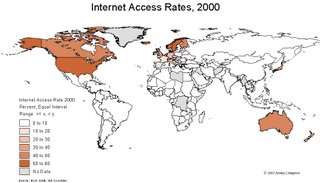 Here are a few modern day buzzterms that are usually shuffled out around universities and research institutes:
Here are a few modern day buzzterms that are usually shuffled out around universities and research institutes:- everyone's a journalist
- everyone's a publisher
- open information
- free communication
- freedom of speech
The ABS found the group of people in Queensland who use the internet most frequently are highly educated 18-24 year-olds with high incomes. I imagine people who publish their own online content are predominantly the same group but maybe a little older.
So are we just preaching to ourselves when we publish online content, and is freedom of online information only valid if you've got an internet connection?
I would argue - at the moment - yes. The digital divide is fairly thick, but I think it's diminishing as broadband is more accessible and information becomes more fluent in regions like the Middle-East and Asia.
Until these countries gain freer access, I guess us rich [*not*] scholars are stuck talking to eachother ...
--
*photo courtesy of GSU
Six to one ...
 Hang on, hang on. So John Howard and Mark Vaile are bitterly opposed to a merger between Queensland's Liberal and National parties, but Howard [Liberal leader] is more than happy to have Vaile [National Leader] as Deputy Prime Minister in the Federal Coalition?
Hang on, hang on. So John Howard and Mark Vaile are bitterly opposed to a merger between Queensland's Liberal and National parties, but Howard [Liberal leader] is more than happy to have Vaile [National Leader] as Deputy Prime Minister in the Federal Coalition?Am I the only one who can't see the difference between Queensland's proposal and the Federal Coalition?
If the merger goes ahead, it's the only strategy the Queensland Opposition has for getting rid of Power-point Pete and his band of hopeless followers.
Go ahead, I say.
--
*photo courtesy of BeatlesStoreLondon
Tuesday, May 30, 2006
Packin' dacks ...
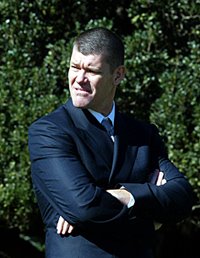 I've written a few posts about the advertising industry and have thus realised what an interesting subject it is to follow. I guess advertising goes hand in hand with the media; one would not exist without the other ...
I've written a few posts about the advertising industry and have thus realised what an interesting subject it is to follow. I guess advertising goes hand in hand with the media; one would not exist without the other ...It turns out Channel 9 - more specifically, James 'packyerdacks' Packer - is suing IceTV for allowing viewers to skip through their ads.
IceTV is a popular new electronic program guide that allows you to queue up your own TV programs, automatically record them, and you view them at your leisure; ads optional. [what a naughty little piece of technology, watch out, here comes grandfather Channel 9 to give you a spanking...]
That's not what Packyerdacks was saying, though. He reckoned it was some king of copyright breach and IceTv had produced a programme that was too similar to Channel 9's. But we all know what he's really bent over; Gerry Harvey isn't getting his incessant Harvey Norman ads to the viewer's eyes (even if he runs them EVERY DAMN MINUTE) so Packyerdacks is losing out and that means someone has to die.
IceTV is confident Nine haven't got a leg to stand on (here's their pdf background of the case), and are confident 9's claim - despite being taken to the federal court - will probably fizzle out soon after the case is examined.
My message: Subscribe to IceTV!!!
--
*photo couresy of The Age
*Chris is not endorsed or employed in any way by IceTV and his comments are a product of his own free will. Nor does Chris have any personal issues associated with Channel 9, although he does think James Packer's head looks like a bowling ball.
Monday, May 29, 2006
It's OK to be old and stale ...
 The newspaper industry is struggling enough without universities encouraging it's antiquity:
The newspaper industry is struggling enough without universities encouraging it's antiquity:"Avoid the word 'yesterday' wherever possible in broadcast journalism. It makes the news sound old and stale. Use it in print journalism."Hah. Yeah, go on, newspapers thrive on being old and stale (aren't they still chiselling words on slate?) ...
--
*photo: Virginia Business
KCB201: I've got that funny feeling ...
 Does anyone else get that childish feeling when they read a book that's just been published? Anyone?
Does anyone else get that childish feeling when they read a book that's just been published? Anyone?No?
Ok it's just me then.
Last night I downloaded Yochai Benkler's new book, The Wealth of Networks: how social production transforms markets and freedom.
You know the one, John gave us the link in week 8? Benkler has made his whole tome available under the Creative Commons License.
And a hefty tome it is. I got Dad to print it out on his work printer: it takes up about 2 inches thick of A4 paper with double-sided printing.
The thing I like about it is, when you're reseaching stuff about Virtual Cultures, any resource older than about 2 years seems outdated and redundant.
[Of course there are the classics - people who were theorising about VCs before the internet became popular - but most other books just seem 'old'. I hired out a book from the library the other day called Blogs. That's it - Blogs - and it was like `whoah man, you can publish your own words on the internet!! Yeah!! This phenomenon is called weblogging, a term which can be shortened to 'blogging.` And I'm like `that was sooo 2001. Contemporise, man!`]
Benkler's book was published earlier this month, and I'd love to say that means the ink is still drying, but I got it off the net so I guess that cliche is meaningless.
Anyway, I'm beginning to like this creative commons stuff.
I'll let you know how the book is when I start reading it.
Friday, May 26, 2006
KCB201: Breaking [not stroking] the news
 For the last few assignments, I've been doing a bit of research into new media and, in particular, the role of bloggers and the effectiveness of blogging.
For the last few assignments, I've been doing a bit of research into new media and, in particular, the role of bloggers and the effectiveness of blogging.There is this widely viewed concept that now `everyone's a journalist` [page of links], and I came across a number of articles that explained bloggers aren't really journalists in a true sense of the word.
I don't think they are; I don't think bloggers who, like me, discuss news can call themselves anything more than commentators or diarists. Let's face it, we're just congregating a bunch of news items [more credible than ours] together and providing our personal view. We don't automatically assume the same position of `journalist` just because we link to a journalist's story.
The idea of participatory cultures is certainly prolific, but this idea that everyone can now become jornalists just doesn't gel when you think about the very nature of consumer-based content. There should be an emphasis on `consumer`.
Until we become professionally qualified to produce information for paid consumption we are merely consumers creating content; heavily biased, ill-informed content.
I think it's too grandiose to call what I'm doing in this blog `journalism`.
I wrote a feature article recently on Australia's free trade agreements with the US, and discussed the options of an FTA with China and ASEAN. In order to write this, I had to first read and research widely on the topic; what FTAs we were involved in, the results of them, who the Australian Government was proposing FTAs with, the implications of them; Australia's stance within the world's economies; who wanted free trade, why; who didn't want free trade, why; then I had to take an angle - Australia should balance our unfair AUSFTA with an innovative FTA with a strong economic region; S-E Asia.
Then I read as many news articles I could to see what the media were saying about the topic, and figure out the possible advantages and disadvantages of an FTA with S-E Asia, and made sure my argument was watertight. Then I found out what the Australian Government, Mark Vaile, John Howard, Trade Opposition Spokesman, Kevin Rudd and Kim Beazley had to say about free trade and take their comments into account and quote them.
Then I had to structure the essay properly, making sure I made my point accurately and fluently using nothing but facts.
THAT is journalism. Journalism is a time consuming activity that [should] regard fact, relevance and ethics above laziness, money and convenience.
Yes, we are becoming more empowered to stake our claims to the public, but who in the public? The technorati? Left-wingers, the far right? Or are we actually reaching anyone or are we just shouting our comments into the cyber-abyss?
Without the foundations provided by a proper news organisation, citizens can not call themselves journalists. Journalists break the news, bloggers [like me, in this blog] simply stroke the news. I disagree with the idea that we can do everything through our computers - GET OUT THERE PEOPLE, go and research a story with real news values, interview people, structure the story, take into account the ethical guidelines of free information and publish your article somewhere.
News bloggers would not exist without journalists, but journalists would [I'm sure] quite happily do without bloggers.
--
image courtesy of DreamFactoryInk
Tuesday, May 23, 2006
Five people shot dead in US
 What a tragic story:
What a tragic story:While you're reading the article, take note of the incredible detail the journalist goes into. Bear in mind, this shooting occurred TODAY.
All the victims are named, the shooter is named, the family's domestic past is described, and the arrest is vividly written.
Newswriting like this would never appear in Australian media. I'm amazed at how freely the whole event is explained!
--
*photo News ; Reuters
Sunday, May 21, 2006
KCB 201: Love a funny little cartoon with a serious message?..
 In Virtual Cultures, we're bang in the middle of discussing the freedom of the internet, who should own it, and how to regulate content.
In Virtual Cultures, we're bang in the middle of discussing the freedom of the internet, who should own it, and how to regulate content.I have presented my views on internet regulation in a previous post [basically, I think popularity for the internet has spawned from citizens' growing desire to communicate on an unregulated platform in an increasingly regulated and limited media environment, thus the internet should be free from government and corporate interaction, and remain one of the final bastions of free and unregulated communication]
Anyway, I found this funny little cartoon (you'll probably need a fast-ish connection) which discusses the US government's upcoming policy on internet regulation and, should it go ahead, what might become of the online environment. Interesting.
The cartoon is connected to Hands Off the Internet, a great website dealing with all the issues of online regulation.
--
image courtesy of Fotosearch.com
Saturday, May 20, 2006
Its as if the mag has no value...
 Now, we all know glossy magazines are usually all shine and no brine, but how about the latest phenomenon of packaging gifts with mags? It's as though the editors acknowledge the words inside are worth nothing so they throw in something more tangible to add value.
Now, we all know glossy magazines are usually all shine and no brine, but how about the latest phenomenon of packaging gifts with mags? It's as though the editors acknowledge the words inside are worth nothing so they throw in something more tangible to add value.But I do love the gender roles displayed:
- Women's mag Vogue Entertaining threw in an oven mitt;
- EVE offered a lovely scarf, whereas;
- Men's mag Modern Fishing gave away a stubby cooler.
While you're at it, have a read of Acolyte's explanation for why most men's magazines are crap. Can't say I disagree...
--
*photo courtesy of Australian Newsagency Blog
Friday, May 19, 2006
It's a gold rush, alright...
 Have you heard about all the money being thrown around for Channel Nine's 'special' on Brant Webb and Todd Russell? It's incredible!
Have you heard about all the money being thrown around for Channel Nine's 'special' on Brant Webb and Todd Russell? It's incredible!Firstly, Nine paid Webb and Russell $2.6m - outbidding Seven's first and final offer of $2.25m - for their story. (and, I assume, their souls as well).
2.6million! They'll want the thing to rate it's pants off. That's about $1 for every Australian who tunes in.
Nine has nudged up advertising rates by 40%, though. To advertise during 'The Great Escape' - say, a 30sec ad every 20mins - you'll fork out the same amount of money it would cost to take you and fourteen mates on a cruise around the world, or seven top of the line Porches.
Steve Allen predicted total ad revenue for 8.30-10.30pm on Sunday will be $5.6m alone. Yowser!
Seven are trying their best to thwart 'The Great Escape' (with a title like that, it's hard not to be cynical), leaking as much information as they can before Sunday - underground photos, helmet with crap in it, etc.
PBL (Nine's father) has enscribed itself into the slate of media history with the most expensive example of chequebook journalism ever seen in Australia. Congratulations 9, you are still the one.
--
*Photo courtesy of Steve McQueen, from the real Great Escape (1963).
Thursday, May 18, 2006
Thought for the week...

Do you think the 'do not call' register will be inundated with so many phone calls it will eventually put itself on the 'do not call' register?
Torino photos
 If you like photojournalism, and you liked this year's winter Olympics in Torino, have a look at this awesome slideshow.
If you like photojournalism, and you liked this year's winter Olympics in Torino, have a look at this awesome slideshow.*Note, the song `Afterglow` by INXS came on the radio just as I began the slideshow. Good song, it really added to the effect... really, it did. I'm not just being a tosser...
KCB201: In-game ads
 The `gamer` demographic is right in the "advertising sweet-spot", according to this article/survey by comScore.
The `gamer` demographic is right in the "advertising sweet-spot", according to this article/survey by comScore.A couple of days ago, I commented on Courtney's blog, Arbitraty Culture, in response to her post about the future of advertising. I added a link to an article which explains how advertising could be seen in Grand Theft Auto.
Well, the comScore article illustrated just how seriously advertisers are thinking about marketing to gamers through their games.
Here are some stats:
- gaming websites reached 72m people in April 2005, and 77m people in 2006. That's a serious market and a serious upward trend [note* only 8m people listen to commercial radio per day in Australia, and they listen for 18h a week, heavy gamers can play up to 40h/wk];
- gamers were found to earn more then $75 000/year and are aged between 18 and 35 - there's a demographic to make any advertiser go 'awl gooowey' inside...
- gamers represent a concentrated group of rich, internet-savvy, people - split equally between male and female.
The survey also says gamers aren't necessarily averse to ads in games, and that they wouldn't stop playing a game simply because it had ads in it. I think gamers are the perfect personality - they're geeky - and they would be more than willing to latch on to a slick marketing campaign; buy the matching shirt and pants, collect the figurines, bellybutton ring...
We're no longer safe from advertising!
--
photo courest of yougeek
Wednesday, May 17, 2006
Moaning Lisa: Critics leave Da Vince Code groaning
 `Maybe the next day I'll forget about it,`
`Maybe the next day I'll forget about it,`That's what one critic said after seeing the premiere of The Davinci Code in Cannes today.
It looks like the film won't match the success novel - I suppose this is nothing new.
Have a read of this uber-geeky deconstruction of the book and how it fails to make sense through pragmatists' eyes.
Peter Brunette said `Tom Hanks was a zombie,` (Somehow I don't think he's just referring to the movie) and Ian McKellen stole the show as Sir Leigh Teabing. Much in the same way Phillip Seymour Hoffman stole the spotlight from Tom Cruise in M:I-3.
--
More than a blogging...
I'm currently in a tutorial for a subject called Journalism Info. Systems,
the second subject this year to ask me to `create a blog`.
Once again, having already established a blog of my own, I'm at an advantage.
JIS is based on the (relatvely) new online journalism movement, and presents all the different techniques for gathering information and publishing news online. They call it C.A.R - Computer Assisted Reporting.
Before this subject, I never knew just how much information is available online. I never knew we could view most press releases, parliamentary meeting transcripts, interview transcripts, speeches, media ratings, news and journal archives, corporate background, and recorded TV and radio purely through the WWW.
We've already written two stories from gathering information usnig only the net, and I found that it's far easier to email your talent than to get them to talk to you on the phone.
Obviously, this week's topic is on blogging. One day I reckon there will be an entire course on blogs and blogging, if the current trend is maintained.
If you're reading this blog, you probably already know about the brushfire popularity of blogs over the past few years, but seeing as though you're probably my tutor, here's a link to show you I am samrt... very samrt.
I apologise to all zero of my other readers for my manditory uni babble, but I'm getting marked for this so tough...
Tuesday, May 16, 2006
KCB201: Played to death
Here's something for game maufacturers to add into their end-user licence agreements:
`The company will not take responsibility if you kill yourelf as a result
of this game`. [I wouldn't be surprised...]
A 13 year-old Chinese boy, Zhang Xiaoyi, commited suicide in 2004 after playing `Warcraft: Orcs and Humans,` a product of the popular Blizzard Entertainment, for 36 hours straight.
`I want to join the heroes of the game,` Zhang said in his suicide note.
Last Friday, Zhang's parents announced they are suing the Chinese game distributor for US$12 500. They obviously believe their son commited suicide as a result of the game - the jury's out...
KCB 201: Not before time...
It appears changing the format of mP3s and putting them on your mP3 player is no longer illegal... finally.
Also, did you know taping stuff off the TV or recording off CDs wasn't illegal? Well it will be under the new copyright laws, but it wasn't... I know everyone does it, but I didn't know it was legal.
Confused? Read all about it here, read or podcast Stephen Long's report on the proposed copyright changes from PM (ABC radio), or just read Phillip Ruddock's media release from May 14.
Just one thing, Phil, where does the creative commons fit in???
And here's an article for all you `mashers`.
.:|| HIGH TIDE REPORT ||:.
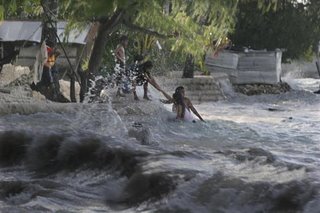 I know, I know, it's late, I know (I have a feeling that I'll start every HIGH TIDE REPORT with those words), the HIGH TIDE REPORT is supposed to come out on Thursdays.
I know, I know, it's late, I know (I have a feeling that I'll start every HIGH TIDE REPORT with those words), the HIGH TIDE REPORT is supposed to come out on Thursdays. Well, I'll eat my words... some at least. Despite my ridicule of News Limited's failing readership in the last HIGH TIDE, it turns out News has had a record year in newspaper sales. Maybe there's some hope for dead-trees after all;
`An unsightly cross between a Winnebago show yard and a gypsy camp`, that's how Amanda Meade and Matthew Denholm described the scene at Beaconsfield;
The Age and Crikey wrote interesting articles about journalistic bribery at the mine, it seems Nine's still the one for underhanded tactics;
Ramona Koval looked at war, propaganda, and the role of the reporter: what kinds of writing tell us most about what we want to know, and what lasts through time;
The world’s largest, most representative survey found that the internet reached 694 users worldwide, and some of the stats are little unusual - Israelis spend the most amount of time online;
KCB 201: Free Speech Freat


As usual, the US Government is all preach and no teach. Have a look at this article, where two ABC journalists' phone calls are being tracked by the CIA. And the control of information doesn't stop there. George Bush is making it easier and easier for his government to spy on people like this.
As a budding journo, THIS IS FRIGHTENING!
KCB 201: Internet regulation: an oxymoron?
 Internet regulation... oooh, I cringe every time I hear it - internet regulation... eeerrghh. `Internet` - good;`regulation` - sure; `internet regulation` - nggarrhhh h h h.
Internet regulation... oooh, I cringe every time I hear it - internet regulation... eeerrghh. `Internet` - good;`regulation` - sure; `internet regulation` - nggarrhhh h h h.Our last Virtual Cultures lecture was on internet governance. Wow, what a topic: what a can of worms! Our lecturer, John Banks, all but assured us it would be a boring lecture, but it turned out to be one of the most interesting...
I'd like to provide a few quotes from an essay I wrote at the end of last year where I looked at the Australian Government's efforts to regulate online content and corporate efforts to control online content and contrasted them with internet as a free-speech environment.
- `Regulating online communication is like regulating everyday conversation, or
regulating what people write to each other in letters or talk about on the
phone...` - `The Australian Government has chosen to regulate online communication in a
similar manner to the way they regulate content on television or radio... this
form is ineffective` - `users have the capacity to interact and contribute to the Internet, so
should they wield the power to regulate it—absent from political
authority...`
In a previous post, I wrote:
- `Little Timmy may not be exposed to nudity on TV before his bedtime, but technically ofay Timmy knows a quick type of the word `boobies` into Google will provide him with all the nudity he wants.`
I think John Banks was right when he said that internet regulation is going to be one of the hottest topics in the coming years as parents and concerned citizens become more concerned with what free speech is doing to society. There's that whole `won't anyone think about the children` paradigm that emerges every time media content comes under scrutiny.
ACMA have implemented a number of initiatives to maintain a certain standard of online regulation, but the only one with any lasting affect is the anti-spam law. Other than that, online content regulation is dealt with in the same way as broadcast media - consumer doesn't like something, they complain to ACMA, and if they feel like it, ACMA will do something--within their limited power-- about it. What a useless aproach! To treat the internet like any other broadcast media is like thinking mobile phones are only used to call people. There's so much more to consider.
The internet subsists in contrast to existing broadcast media, it's a `sit forward` platform, not a `sit back` medium, and regulation policy should reflect that. At the moment, the Australian Government recognises the changes and progressions in the global media environment but, as yet, has not provided a policy to complement it.
John also raised an interesting debate surrounding the global internet govrnance authority, ICANN. I found a few interesting sites and blogs just by googling ICANN--here, here, and a funny little cartoon here. The major concern about ICANN is that they are basically the largest and most powerful internet governance organisation in the world, and yet it's based in the US. So much for the DECENTRALISED WORLD WIDE WEB.
--
Photo courtesy of LessHost.com
Tuesday, May 09, 2006
KCB201, Community Participation Task: Virtual Community Report
 The online community I chose to describe is Digital Photography Review.
The online community I chose to describe is Digital Photography Review.DPReview was very helpful when I was looking for a new camera, as it has reviewed just about every digital camera on the market and new reviews come out as soon as new cameras hit the shelves. Also, they have the option of comparing any two cameras side by side: something no magazine or department store assistant will ever be able to do.
The forums are what make an online community out of DPR members; there are no other services that exclude DPR members from ordinary visitors. This is an underachievement for a web site that has 18 million members. However, the forums are very comprehensive. There is a forum for just about every brand of camera. This is a great facility for new and experienced users because they can obtain quick—sometimes instant—feedback on any queries.
Sometimes it’s hard to tell whether your photos appeal to a large audience when you are the only critic, and one of the most useful forums I’ve participated in is the ‘Samples and Galleries’ forum. This is where members can post up their photos for admiration and critique by other community members. This service helps amateur photographers—like me—gain a better sense of what we are doing right and wrong in our photography.
I have to say that without such a comprehensive list of forums, I would not keep coming back to DPR: my interaction would have stopped after I bought my new camera.
--
You can view my contributions here, here, here, here, here, and here. Oh, and here. [you will have to scroll through to find my posts. my nickname is cpahor]
The Miners Are Out
 Brant Webb and Todd Russell were rescued from the Beaconsfield Mine this morning at about 5.00.
Brant Webb and Todd Russell were rescued from the Beaconsfield Mine this morning at about 5.00.They walked out of the mine, having been trapped in a 1.2 x 1.2m cage for the past 13 nights.
I can't believe two men who have been kneeling and sitting for over 300 hours have the ability to walk normally.
The men are being treated at Launceston Hospital now. Psychologists say they must stay together for fear of what I assume is some kind of mental backlash caused by being overwhelmed by the outside world.
The families of Brant and Todd are apparently already into the beer... 7am.
Comiserations to the family of Larry Knight, who was killed in the mine collapse. Larry will be buried today at 1.00pm.
Sunday, May 07, 2006
Death of a journalist
 Richard Carleton has just died at Beaconsfield gold mine in Tasmania.
Richard Carleton has just died at Beaconsfield gold mine in Tasmania.He asked a question at a press conference and then left, collapsing to the ground and dying soon after.
I believe the cause is a heart attack: Carleton had a history of heart disease.
John Howard has extended his deepest sympathies to Richard Carleton's family and colleagues.
"Whatever Richard was he was not a shade of grey, he was a primary colour," Peter Harvey said.
--
photo courtesy of ABC News
.:|| NO HIGH TIDE||:.
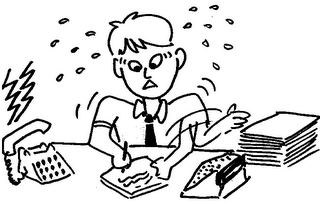
There will be no HIGH TIDE media report this week as I am far too busy with uni assignments.
This is a shame because there has been no shortage of interesting topics surrounding the Beaconsfield Mine and the 10th `anniversary of the Port Arthur Massacre.
HIGH TIDE will return next week
--
cartoon courtesy of http://tell.fll.purdue.edu/
Wednesday, May 03, 2006
Who wants what they don't need?
 Isn't is sad that mobile phones have achieved such market saturation that telcos will soon be marketing them to young and un-needy consumers?
Isn't is sad that mobile phones have achieved such market saturation that telcos will soon be marketing them to young and un-needy consumers?`Telcos aim mobile telephony at a pubescent market`
Maybe they could advertise phones to kids through video games?..
--
The wrong language is taking over the blogosphere: bloggers should watch their language.
--
Boing Boing; read about the controversy and celebrity surrounding super-chic-geek, Cory Doctorow. [Cory's Wiki definition here]
--
photo courtesy of pfcca.org
--
Tuesday, May 02, 2006
It's all about the he said/she said...

*Journalist interviewing a politician should always think*
`Why is this bastard lying to me?`
(Harold Evans)
*Pollie being interviewed by journalist should always think*
`How will this bastard distort what I'm saying?`
Monday, May 01, 2006
KCB 201: Google Idol
 Gidol is more than a fun internet craze. It's a prime example of what the experts call "consumer-generated content", where ordinary folk either usurp the big corporations and advertising agencies or are used by them to spread a more believable, spin-free message.
Gidol is more than a fun internet craze. It's a prime example of what the experts call "consumer-generated content", where ordinary folk either usurp the big corporations and advertising agencies or are used by them to spread a more believable, spin-free message. 



